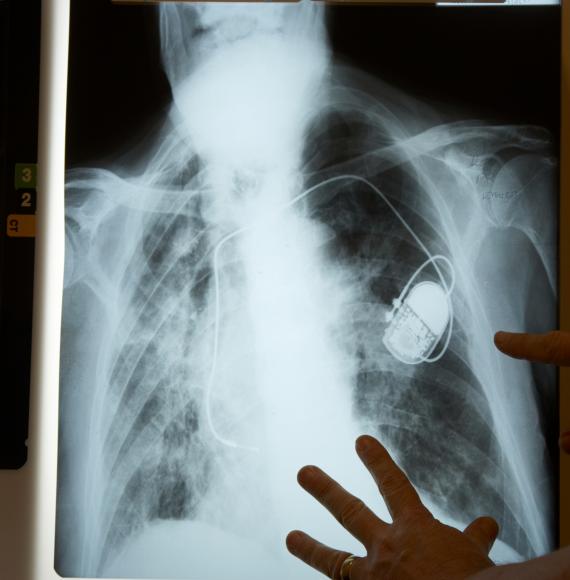The NHS has committed to becoming the world’s first net-zero healthcare system by 2040. With this in mind National Health Executive’s Net Zero 2025 online conference brought together healthcare leaders, sustainability experts and policy makers to discuss the numerous strategies for how the NHS can reduce carbon emissions, and improve its environmental sustainability.
Opening Keynote
In the first session of the conference, we took a deep dive into the NHS's ambitious goal of achieving net zero carbon emissions by 2030. With the healthcare sector responsible for about 4% of the UK's total carbon emissions, the NHS plays a pivotal role in the fight against climate change while ensuring high-quality patient care.
This year marks a significant acceleration in the NHS's sustainability efforts, as they implement greener technologies and reduce waste. One of the key initiatives includes a £6.5 million government-funded net zero hub led by the University of Exeter, aimed at fostering research and innovation to shrink the NHS's carbon footprint. Moreover, NHS England has mandated that suppliers with contracts exceeding £5 million publish a carbon reduction plan, aligning their efforts with the NHS's net zero target.
Despite these promising initiatives, public awareness of the NHS's net zero policy remains low. A recent survey indicated that only 18% of the public was aware of the policy, a decline from 23% in May 2022. However, once informed, 57% expressed support for the initiative, although this figure has decreased from 70% in 2021.
The path to achieving net zero is fraught with challenges. Many NHS buildings are energy inefficient and require costly retrofits, while a staggering 62% of emissions originate from suppliers, highlighting the necessity for sustainable procurement. Additionally, the logistics of transport must transition to greener alternatives, and reducing medical waste—particularly single-use plastics—poses a significant challenge due to hygiene requirements.
Funding presents another hurdle, as the decarbonisation process demands substantial investment without compromising patient care. Furthermore, changing behaviours among staff and the public to adopt greener practices is a gradual process that requires time and commitment.
Transport
In a world increasingly aware of climate change, the NHS is stepping up to the challenge with a bold vision for sustainable transport. In the first panel discussion of the day, experts Jonathan Guppy, Janet Smith, and Bret Willers delved into the critical role of transport in achieving the NHS's net zero target by 2040.
Transport is not just about moving patients; it is a vital part of the NHS's operational framework that influences both efficiency and environmental impact. The panel highlighted the innovative strategies being employed to transition to greener alternatives, including electric ambulances and hydrogen-powered fleets.
Janet Smith emphasised the importance of a step-by-step approach to transitioning the NHS fleet. With over 145 vehicles to consider, the challenge lies not only in funding these transitions but also in ensuring the necessary charging infrastructure is in place. This pragmatic planning is crucial, especially in a resource-strapped environment like the NHS.
Jonathan Guppy added that data-driven decision-making is essential for understanding the implications of a fully electric fleet. By conducting a site-by-site analysis, they can identify the maximum demand on the grid and work with distribution network operators to increase supply capacity. This level of analysis is not just about efficiency; it's about ensuring that the transition is feasible and sustainable.
Brett Willers brought another perspective, discussing the accessibility of services and how transport policy can impact patient care. He shared insights from previous experiences where transport issues influenced hospital location decisions, highlighting the need for a holistic approach to planning healthcare services.
As the discussion progressed, the panel recognised the importance of collaboration among various agencies. By working together, they can address the challenges of transport in healthcare more effectively. This includes not only the NHS but also local councils and community organisations, all of which play a role in shaping a sustainable future.
The panel concluded with a sense of optimism. With the right initiatives and a collective effort, the NHS can not only meet its targets but also lead the way in promoting healthier lifestyles and reducing carbon emissions. As we look towards 2040, it is clear that the journey towards sustainable transport is not just a goal but a necessity for the future of healthcare.
New Technologies
The NHS, a significant contributor to carbon emissions, is on a mission to achieve net zero by 2040. But how can new technologies aid in this ambitious goal? In the second leaders debate of the conference, an expert panel, consisting of industry leaders and healthcare professionals, shared their insights on the latest advancements in green technology and how they are transforming the NHS.
The discussion kicked off with an exploration of the challenges the NHS faces in adopting new technologies. The panellists highlighted the importance of addressing not just the technology itself, but also the people and processes involved. Digital inclusion is a critical factor; with millions lacking basic digital skills, ensuring that all patients can access these new technologies is paramount.
As the conversation progressed, the panel delved into the role of interoperability and efficiency in healthcare. With many patients becoming increasingly tech-savvy, the NHS must bridge the gap between advanced technology and the needs of its diverse patient population. Simple innovations, such as AI-powered energy management systems and refillable medical devices, can significantly reduce waste and improve patient care.
One of the standout moments in the discussion was the emphasis on communication. Panel member Pete Lillie stressed the need for effective dialogue between stakeholders to facilitate the adoption of sustainable practices. By presenting sustainability as a financial opportunity rather than just an environmental necessity, the NHS can drive quicker adoption rates of green technologies.
The panel did conclude on a positive note, with panellists expressing optimism about the future of sustainability in healthcare. By embracing innovative technologies and fostering a culture of sustainability, the NHS can lead the way in creating a greener future for healthcare.
Procurement Act 2023 NHS and Sustainability
As the NHS embarks on its journey towards net zero, the Procurement Act stands as a pivotal piece of legislation that emphasises transparency, efficiency, and environmental responsibility. This topic formed the basis of the third panel discussion of the day, with a experts convening to discussion procurement and sustainability across the NHS.
The act aims to streamline procurement processes while ensuring that suppliers align with crucial sustainability goals, such as reducing carbon emissions and minimising waste. This shift not only impacts how the NHS operates but also encourages collaboration with innovative suppliers who are committed to delivering high-quality patient care with a lower environmental impact.
During the discussion, Neil Hind, Head of Commercial Consulting at NHS Shared Business Services, highlighted the act's potential to provide greater flexibility in considering social value and environmental concerns during the tendering process. The transition from the traditional economically advantageous tendering approach to a more innovative one signifies a significant shift in priorities, moving towards sustainability.
Nick Allen, an Industry Procurement Advisor at Health Innovation Manchester, emphasised the readiness of NHS trusts in Greater Manchester to adapt to the new act. With many trusts engaging in online training and webinars, there is a collective effort to ensure that all stakeholders are well-informed about the changes and their implications.
Kelly Wilson, Head of Net Zero and Sustainable Procurement at NHS England, elaborated on the NHS Net Zero Supplier Roadmap, which sets out the direction for sustainable procurement. This roadmap not only outlines milestones but also fosters transparency and engagement with suppliers, ensuring that everyone is aligned in their pursuit of sustainability.
However, the panel acknowledged the challenges that smaller suppliers may face in adapting to these new requirements. There is a need for ongoing support and clear communication to prevent any potential burdens that could deter SMEs from participating in the procurement process.
As the discussion unfolded, it became clear that the success of the Procurement Act hinges on collaboration between buyers and suppliers. Engaging in open conversations and sharing best practices will be essential in navigating this new landscape. The act is not merely a regulatory change; it represents an opportunity for the NHS to lead by example in promoting sustainable practices within the public sector.
Education, Sustainability and the Future of Healthcare
In the ever-evolving landscape of healthcare, the role of education has never been more crucial, especially when it comes to sustainability. In the second keynote of the conference, delegates were joined by Melanie Madison, a lecturer from King's College London. As part of a ‘fireside chat’ Melanie explored the intricate connections between education, sustainability, and the future of healthcare.
Melanie began by highlighting the importance of empowering both current and future healthcare professionals with the knowledge and skills necessary to tackle the pressing challenges posed by climate change and environmental degradation. She pointed out that education is not just about imparting knowledge; it is about fostering a mindset that embraces sustainability as a core value.
One of the key topics discussed was the Clinical Skills Sustainability Group, which is actively working to reduce the carbon footprint of clinical skills and simulation centres. By collaborating with local NHS trusts, this initiative exemplifies how education can extend its impact beyond the classroom, contributing to a more sustainable healthcare system. Melanie emphasised that the future workforce is not alone in this endeavour; they can leverage the tools and skills provided through education to make meaningful changes in their practice.
Throughout the conversation, Melanie also delved into the challenges faced by healthcare professionals in adopting sustainable practices. Melanie shared her experiences teaching post-qualification nurses and doctors who are eager to return to education to drive change in their own clinical environments. By equipping them with quality improvement methodologies, they can identify areas for enhancement within their own services, fostering a culture of sustainability.
The session also touched on the significance of collaboration. Melanie pointed out that no one can tackle the issue of sustainability alone; it requires teamwork and a collective effort. She encouraged listeners to engage with like-minded individuals and organisations, fostering a sense of community and shared purpose.
As the discussion wrapped up, Melanie left attendees with a powerful reminder: 'If it's good for the planet, it'll be good for your patient.' This sentiment encapsulates the essence of what we discussed—sustainability is not just an adjunct to healthcare; it must be woven into the very fabric of how we deliver care.
Sustainable Waste Management
In the final leaders debate of the day, experts gathered to tackle a crucial issue: sustainable waste management in the NHS. With the NHS being one of the largest healthcare systems globally, producing over 600,000 tonnes of waste each year, the need for effective and sustainable waste management practices has never been more pressing.
The panel, composed of leaders in sustainability from various NHS trusts, highlighted the ambitious goal of achieving net zero emissions by 2040. This target is not just about waste disposal; it encompasses reducing waste at the source, improving recycling methods, and adopting circular economy principles to minimise environmental harm while ensuring patient safety.
One of the key points raised was the importance of workforce training and infrastructure modernisation. Alison Watson, Greener NHS Lead, emphasised that achieving the NHS's waste segregation goals requires dedicated waste managers and upgraded treatment facilities. However, challenges such as fragmented waste contracts and workforce resistance to changing established habits remain significant obstacles.
The panel also discussed successful collaborative initiatives, such as the Kenton Medway NHS Total Waste Management Consortium, which demonstrates how working together can lead to sustainable progress. This consortium has implemented standardised practices across trusts, achieving a zero-to-landfill policy and ambitious recycling targets.
Behavioural change was another vital topic. Janet Smith, Head of Sustainability at the Royal Wolverhampton NHS Trust, shared insights on how changing staff habits is crucial for effective waste management. Educating staff on proper waste disposal and the importance of recycling can help create a culture of sustainability within healthcare settings.
Patients also play a role in this sustainability journey. Engaging patients in waste reduction initiatives, such as encouraging them to bring their own bags, can significantly impact the environment. The panel agreed that raising awareness among patients about their contribution to waste management is essential.
As the discussion wrapped up, the panel remained optimistic about the future of sustainable waste management in the NHS. With continued collaboration, innovative solutions, and a commitment to education, the NHS can achieve its sustainability goals while ensuring the safety and well-being of patients.
In order to gain the crucial insight that was passed on by the experts on all of the day’s panels, watch the full online conference on demand here.



















